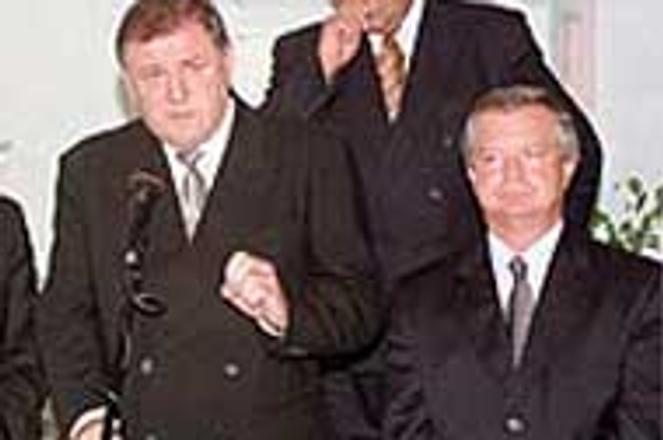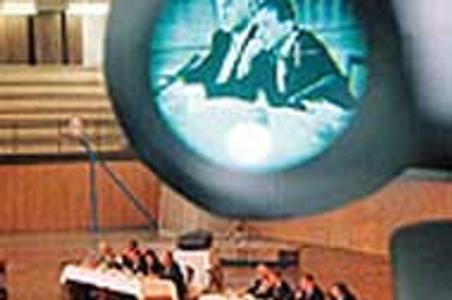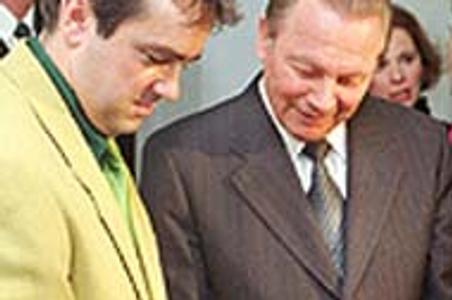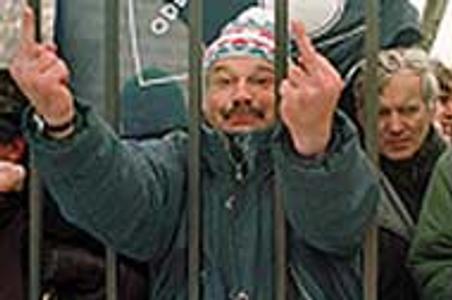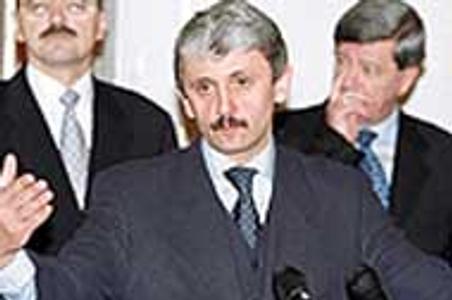Archive of articles - December 1999, page 2
If you desire to read an old article, use the search bar or select the publication date.
Domestic Politics
Although the Dzurinda government was hounded throughout 1999 by speculation that it would not survive its full four-year term in power, the cabinet managed to pass a number of key laws and to defy expectations that it would be torn apart by bickering.The government endured many rocky moments, with the resignation of two key ministers and constant tensions over the future of largest member party, the SDK. Former Prime Minister Vladimír Mečiar predicted early elections throughout the year, and added that his opposition HZDS party had been holding "secret negotiations" with members of the ruling coalition on forming a new government. Meanwhile, rising unemployment and falling real wages sparked union protests and the threat of a national strike.
Slovak Companies: Key dates
June 22- Mysterious sale of a 45.9% stake in Nafta Gbely to American giant Cinergy.September 22 - Shareholders meeting at eastern Slovak steel maker VSŽ confirms Gabriel Eichler as president and upholds the management's restructuring policy.
Schuster memoirs anger government
Slovak President Rudolf Schuster is again in trouble with ruling coalition politicians, this time for writing a book of recent memoirs scheduled to be released December 21. The book, called 'A Return to High Politics,' describes negotiations in September 1998 on the formation of the ruling coalition and the alleged attempt of three coalition parties to keep the Hungarian party out of government.Prime Minister Mikuláš Dzurinda, when presented with a draft of the book, recommended that Schuster not publish it, calling it "a very unfortunate step." Deputy Prime Minister Pavol Hamžík, currently chairman of governmental Party of Civic Understanding (SOP) that Schuster founded in 1998, said the book offers readers "a one-sided view which doesn't correspond to reality."
Slovak companies
The year 1999 was a year for the financial stabilisation of many Slovak companies. After the excesses of some companies during the Vladimír Mečiar era, notably the spendthrift ways of steelmaker VSŽ, these companies were forced to adopt strict measures which hurt their production figures and investments. Some shipping and trading companies suffered losses due to Kosovo crisis in the first half of the year.The oil refinery Slovnaft in March 1999 hired the investment bank Salomon Smith Barney to help the refinery find an investor. In June, Company President Slavomír Hatina declared that Slovnaft would welcome an investor from central Europe. The most probable candidate for the future partner is the Austrian OMV refinery.
Hell makes believers of beer drinkers
Forget fire and brimstone and fears of damnation, for the experience of Hell may not be all that bad. That is, if it's Slovakia's Hell beer of which you speak.Hell beer has been pleasing the palates of beer drinkers in central Slovakia since 1473, and a recent partnership with exporter Weldon Walshe EEDC - to form Hell-UK Limited - now means that tipplers in England can get a taste of the underworld. Based on the solid Slovak-United Kingdom relationship, Hell's influence may soon reach far beyond the borders of Europe.
QUOTES OF THE YEAR
"Do we Slovaks want [the Hungarians] to return... and teach us the Lord's Prayer in Hungarian? No way! We will jump into our tanks, and we will go and flatten Budapest... We will fight, fight for our land, we will fight for every square metre. We won't give even a square centimetre to those Hungarian assholes... Oh, and pardon us. We Slovaks are all racists. And for that reason I say - my brothers, we still have our armaments factories and we still know how to make tanks. Very good tanks..."Ján Slota, chairman of the Slovak National Party (SNS), at a party rally on March 5.
Slovaks paid better than stats show
At the turn of the 20th century, Slovak citizens may not be as well-paid as they were in 1989, but they may also be a lot better-off than they believe.According to economic results for the third quarter of 1999 released in early December by the Slovak Statistics Office, real wages declined from July to September by 6% from the same period in 1998. People's falling purchasing power was reflected in the fact that household consumption was down 1.4% in the same period after a growth of 1.1% and 1.5% in the first two quarters of the year.Despite the gloomy figures, economic analysts said that people had not been as badly affected by the year's price hikes and economic 'austerity packages' as had been feared in January.
Macro-economy 1999: Key dates
January 7 - First austerity package is approved by the government to restore fiscal discipline, reduce budgetary expenditures and increase revenues.May 31 - Second austerity package approved by government raises value added tax, imposes an import surcharge and deregulates prices in an effort to increase state revenues.
Foreign Direct Investment
Despite the fact that in 1999 Foreign Direct Investment (FDI) to Slovakia was lower than last year, several major international companies launched sizable investments while many foreign firms already operating in the country poured additional resources into increasing their output.Still, foreign investment came far below expectations, amounting to 5.9 billion Slovak crowns ($150 million) in the first half of 1999, 1.7 billion crowns less than in the same period of last year and a fraction of the $500 million that former Economy Minister Ľudovít Černák set as a goal for 1999.
Slovakia extended EU invitation
As a Christmas gift, the invitation to Slovakia to begin negotiations on entry to the European Union at an EU summit in Helsinki on December 11 left only one thing to be desired - a concrete date at which Slovakia might expect to become a member of the Union.The assembled heads of state of the 15 EU member countries - known collectively as the European Council - invited Slovakia, along with Romania, Bulgaria, Lithuania, Latvia and Malta to begin entry negotiations with the EU, but said the date at which each country might join the group would depend on how quickly the prospective members could prepare for accession.Preparation for EU entry, in turn, is a matter of how quickly each country can fulfill the 29 'chapters' of the acquis communautaire, a body of legal and adminstrative standards common to EU countries.
EC report crowning achievement of 1999
In a year featuring the murder of a former Economy Minister, the first-ever direct election of a Slovak President, the passage of a historic Minority Language Law and the trial of the country's top mafia boss, political analysts say one event stands out above the rest: the decision of the European Union on December 11 to invite Slovakia to begin entry negotiations."The decision to enlarge the European Union by including the countries of the former communist bloc was the most important decision since the end of the World War II," said Ľuboš Kubín, a political scientist at the Slovak Academy of Sciences. "For Slovakia, the official invitation to begin entry negotiations was the key event in 1999. Our country now has a chance to become part of a civilized circle of European countries."
Rapid pace of legislation hurts quality
The government of Mikulaš Dzurinda has over the last year quickly put into effect many needed laws for the economic transformation of the country that the former government of Vladimír Mečiar had left on the shelf. Though analysts have applauded the pace of reform, however, they have expressed doubts about the quality of the new legislation.Because many crucial economic laws are passed in accelerated legislative proceedings in parliament, little discussion or profound consideration of the effects of each bill is possible. As a result, badly framed laws often need to be revised to counter their unforeseen effects on the economy. The constant need to repair approved legislation is also creating a back-log, delaying the passage of important bills such as the bankruptcy law.
Diplomats hit high gear for Helsinki
As Slovakia geared up to receive a verdict on its EU membership plans in Helsinki on December 11, the country's officials were leaving nothing to chance, engaging in a last minute flurry of diplomatic visits and exchanges designed to cement support among EU member nations.Prime Minister Mikuláš Dzurinda paid a December 3 visit to Portuguese Prime Minister Antonio Guterres and Portuguese President Jorge Sampaio. Portugal holds the EU Presidency for the first half of the year 2000, and if the Council of Europe decides in Helsinki to begin EU membership talks with Slovakia, as is widely expected, Portugal's leadership will be crucial in deciding how soon these entry talks begin.Following the meeting with Guterres, Dzurinda declared that "today, in Lisbon, our diplomatic activities leading up to Helsinki reached their peak."
- Slovak female triathlete shatters barriers with historic win at Himalayan event
- Top 10 events in Bratislava for foreigners
- No more photos or bank statements? Slovakia moves to ease residence process
- Slovakia loses another EV model to Spain as Stellantis chooses Zaragoza over Trnava
- Weekend: Celebration of fun comes to Malacky Photo
- Convicted of multiple murders, Slovakia’s mafia boss seeks release from prison
- News digest: Prosecutor seeks jail for NBS Governor Kažimír as his political support wanes
- UK appoints Bilal Zahid as new ambassador to Slovakia
- Top 10 events in Bratislava for foreigners
- Weekend: Celebration of fun comes to Malacky Photo
- No more photos or bank statements? Slovakia moves to ease residence process
- Slovakia loses another EV model to Spain as Stellantis chooses Zaragoza over Trnava
- News digest: Prosecutor seeks jail for NBS Governor Kažimír as his political support wanes
- Convicted of multiple murders, Slovakia’s mafia boss seeks release from prison
- Slovak female triathlete shatters barriers with historic win at Himalayan event
- News digest: Fico’s bloc wants to save money by restricting electoral access
- Maria Theresa on the banks of Bratislava
- No more photos or bank statements? Slovakia moves to ease residence process
- 3 free things to do in Bratislava in the next seven days
- Weekend: Celebration of fun comes to Malacky Photo
- Top 10 events in Bratislava for foreigners
- Digital Jarvis is real now. He is coming for your to-do list
- The Kremlin’s security agency has a Russian contractor in Slovakia - no one has noticed
- The disinformation scene has become a tool of media capture
- Maria Theresa on the banks of Bratislava
- No more photos or bank statements? Slovakia moves to ease residence process
- A mayor resigns over €2.7 million fraud scandal at town hall
- He designed Gatwick. But this is his masterpiece
- Fico praises China and Vietnam as models, says liberal democracy has failed
- News digest: Violent gang in Bratislava is under arrest
- The Kremlin’s security agency has a Russian contractor in Slovakia - no one has noticed
- The compass points to Kúty, and people are starting to follow
- News digest: Prosecutor seeks jail for NBS Governor Kažimír as his political support wanes
- Slovakia loses another EV model to Spain as Stellantis chooses Zaragoza over Trnava
- Slovak female triathlete shatters barriers with historic win at Himalayan event
- Weekend: Celebration of fun comes to Malacky Photo
- News digest: Fico’s bloc wants to save money by restricting electoral access
- Slovakia plans to restrict access to new medicines amid funding shortfall
- No more photos or bank statements? Slovakia moves to ease residence process
- Top 10 events in Bratislava for foreigners More articles ›

